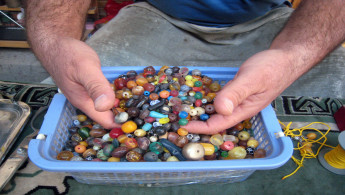Belief in sorcery and supernatural on rise in Iraq
A number of Iraqi civil society organisations warned of the growing trend of witchcraft and sorcery in Iraqi society on Tuesday.
Large numbers of Iraqis have been seeking the services of witchcraft and sorcery practitioners in recent years, which has resulted in social and security problems, while the ministry of interior has vowed to clamp down on practitioners.
"This growing phenomena in southern governorates and Baghdad requires government action in addition to efforts to raise religious and cultural awareness," said Samir Mohammad a member of the Network for Iraqi Civil Society Organisations.
Mohammad explained that there are hundreds of sorcerers and witchcraft practitioners who offer their services to Iraqis of both genders, which amounts to a social crisis.
These practitioners of the dark arts prey of people who have familial, social or financial troubles with the promise of providing quick solutions, however clients end up in more trouble than before, according to Mohammad.
"These activities have caused divorces and family breakup in addition to several youths eloping. In some cases people have been killed as a direct and indirect result of these activities," said Mohammad.
"The spread of witchcraft and sorcery is linked to the ignorance of a society," added Mohammed who told The New Arab that clients include politicians and MPs.
The right market
Sorcerers carry out strange rituals and provide clients with services such as curses against enemies, amulets for love, protection and financial prosperity, in addition to promising to solve the client's problems.
They have become increasingly popular amid the lawlessness of post 2003 Iraq, where the collapse of educational institutions and failure of consecutive governments have pushed people to embrace old superstitions.
One sorcerer who spoke to The New Arab is known locally as Abu al-Kiraz or "the man with the beads" as he specialises in selling various stones that he claims have supernatural qualities.
One of the beads he has on sale is a bead he claims to protect against bullets. Ironically however, he told The New Arab that he sustained a gunshot wound to the shoulder by accident at a wedding.
The prices of Abu al-Khiraz's beads vary, with some going for over $1000, with a steady stream of military officials and MPs who buy his beads because they fear assassination.
 |
While most clients were believed to be uneducated rural women, social researcher Rania Abdul Wahid says that clients vary and include people with advanced degrees. |  |
The increasing demand for the services of sorcerers and witchcraft practitioners has inadvertently boosted business for Iraqi herbalists, as demand for herbs for various potions and concoctions has revived the herb market.
"I have many clients who come to buy various herbs. Sometimes I get orders for strange herbs and when I inquire about the reason I discover that they've been to see a sorcerer," said Mudhaffar al-Obaidi, a Baghdadi herbalist.
"Sorcerers send their clients with a list of herbs they should buy to carryout the service they're providing," added al-Obaidi.
While most clients were believed to be uneducated rural women, social researcher Rania Abdul Wahid says that clients vary and include people with advanced degrees.
"During my research I found that clients include senior military and political officials who buy amulets for protection, money and power. There are also people with advanced degrees who seek these services," said Abdul Wahid.
Colonel Mohammad Talib al-Musawi, an officer in the ministry of interior's anti-crime unit told The New Arab that many of the sorcerers use the guise of religion to cover their activities and claim to offer voluntary services but they are "charlatans".
"We need the support of religious leaders more than ever before to combat this charlatanism that is plaguing society," said al-Musawi.
Some so-called "healers" have their own television shows on private satellite channels, where people call in for advice and "remedies".
The Iraqi government has been criticised for its silence regarding this growing trend, while some observers accuse senior officials of having connections to this strange underworld to explain the lack of action.
Sorcery is an offence in Iraqi law that is punishable by a maximum sentence of five years imprisonment.



